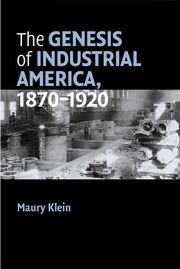Book contents
- Frontmatter
- Contents
- Series Editor's Foreword
- Introduction: The Business of America
- Prologue: A Hothouse for Economic Growth
- 1 The Marvel of Men and Machines
- 2 The Lure of Lovely and Lucrative Land
- 3 The Defeat of Distance and Desolation
- 4 The Potential of Plentiful Power
- 5 The Fabrication of Familiar Forms
- 6 Bargaining with Behemoths
- 7 The Collision of City and Country
- 8 The Mastery of Mass Markets
- Epilogue: The Boundaries of Big Business
- Sources and Suggested Readings
- Index
2 - The Lure of Lovely and Lucrative Land
Published online by Cambridge University Press: 05 June 2012
- Frontmatter
- Contents
- Series Editor's Foreword
- Introduction: The Business of America
- Prologue: A Hothouse for Economic Growth
- 1 The Marvel of Men and Machines
- 2 The Lure of Lovely and Lucrative Land
- 3 The Defeat of Distance and Desolation
- 4 The Potential of Plentiful Power
- 5 The Fabrication of Familiar Forms
- 6 Bargaining with Behemoths
- 7 The Collision of City and Country
- 8 The Mastery of Mass Markets
- Epilogue: The Boundaries of Big Business
- Sources and Suggested Readings
- Index
Summary
It was all prices to them: they never looked at it: why should they look at the land? they were Empire Builders: it was all in the bid and the asked and the ink on their books.
– Archibald MacLeishThe american economic hothouse began life with more soil than anyone had ever imagined. Since ancient times land has served as the major source of wealth and productivity. Not by accident did ruling classes everywhere consist of those who owned or controlled the land. From the very beginning the promise of American life, the appeal it held out to newcomers, revolved around land – boundless acres of a commodity so unavailable in their native countries. The lure of land for settlers involved not only sustenance but independence, the prospect of enhanced dignity and self-worth, and the hope of passing a material legacy onto one's children. For the vast majority of Americans in the preindustrial era, farming was both their livelihood and their way of life, whether on a small New England plot wrested from the rocky soil, a sprawling southern plantation, or a prairie spread where the sky seemed never to end.
Land helped shape the American character in many ways. It encouraged attitudes of independence, self-reliance, and individualism that many observers found typical of Americans. It promoted an almost mystical faith in the promise of the future as well as a realm in which a person could escape from his past.
- Type
- Chapter
- Information
- The Genesis of Industrial America, 1870–1920 , pp. 35 - 56Publisher: Cambridge University PressPrint publication year: 2007

